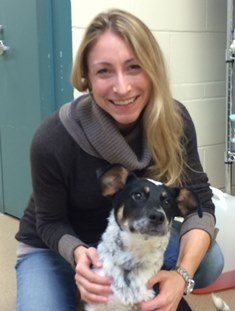Christine Sibigtroth, DVM

Dr. Sibigtroth is working on a combined Neurology/Neurosurgery Residency and PhD in the Interdisciplinary Neuroscience Program at the University of Missouri with Dr. Joan Coates as her major advisor. She has a sincere enthusiasm for research and has a passion for study of canine degenerative myelopathy (DM) and neuroscience.
Fellowship Research Project
Canine degenerative myelopathy (DM) is an adult onset progressive neurodegenerative disease in dogs that shares many characteristics with inherited amyotrophic lateral sclerosis (ALS) in humans. ALS triggers a deterioration of the nerves that connect the brain to the muscles, leading to stiffness, slowing of movement, loss of muscle tissue and weakness. Dogs with DM initially develop incoordination and progressive weakness of their rear legs resulting in paralysis within one year from onset of signs.
The immune system, specifically microglia, the primary immune cells of the central nervous system (CNS), has been implicated in ALS disease progression. Dr. Sibigtroth’s hypothesis is that the normal communication between motor neurons and microglia is similarly disrupted in canine DM, inducing a behavioral change in microglia cells. Microglia may transition from a neuroprotective to neurotoxic behavior, leading to progressive motor neuron damage and dysfunction. Owners of dogs with DM tend to have their pets euthanized at different stages of disease severity, and examination of the donated tissues from these dogs will provide an effective way to study the various stages of DM progression. Her work will provide valuable insight into the role of microglia within canine DM disease progression and could identify key areas for the development of microglia-specific therapeutic targets that could slow or halt further disease progression.
Dr. Sibigtroth's research is proudly supported by the American German Shepherd Dog Charitable Foundation, Inc.
Learn more about the AKC Canine Health Foundation Clinician-Scientist Fellowship Program and Adopt a Researcher.
Help Future Generations of Dogs
Participate in canine health research by providing samples or by enrolling in a clinical trial. Samples are needed from healthy dogs and dogs affected by specific diseases.



